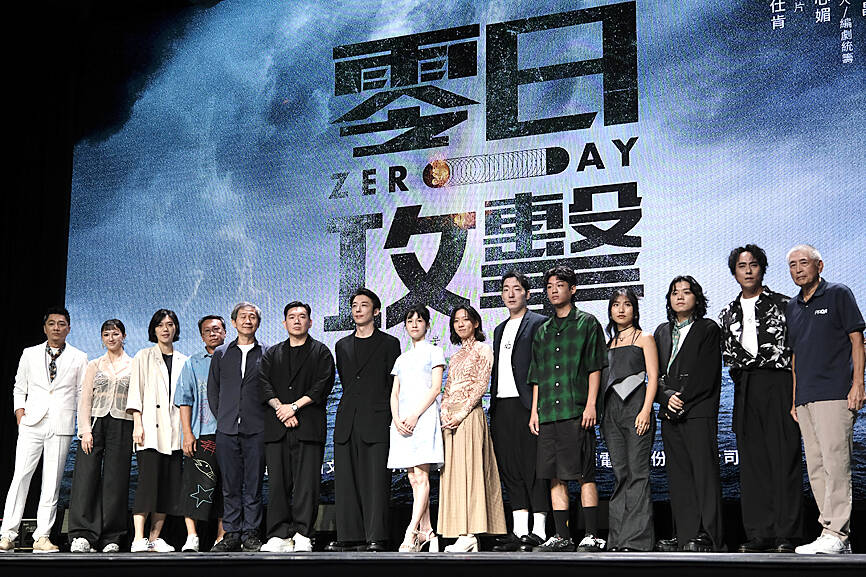A Chinese war plane goes missing near Taiwan. China sends swarms of military boats and planes for a blockade as Taiwan goes on a war footing. Panic ensues on the streets of Taipei.
That is the premise of Zero Day (零日攻擊), a new Taiwanese TV drama envisioning a Chinese invasion. It is a topic that has for years been considered too sensitive for many Taiwanese filmmakers and television show creators, who fear losing access to the lucrative Chinese entertainment market.
However, as China continues to step up military threats, including conducting daily military activities close to Taiwan, the upcoming drama confronts the fear by setting the 10-episode series around a Chinese invasion of the nation.

Photo: CNA
“We thought there is freedom in Taiwan, but in film and TV production we are restricted by China on many levels,” Zero Day showrunner Cheng Hsin-mei (鄭心媚) said.
China has a much larger market for film and television. Taiwanese entertainers are popular there, partly due to language and cultural similarities.
However, creators in free and democratic Taiwan are indirectly confined by Beijing’s powerful state censorship, Cheng said.
Beijing has regularly called out Taiwanese artists seen as going against China’s political ideology and has threatened to blacklist those unwilling to cooperate.
For the Zero Day crew, confronting such a sensitive topic means facing difficulties, from funding and casting to finding places to film.
Cheng said more than half of the Zero Day crew asked to remain anonymous, and some people, including a director, pulled out of the production at the last minute due to worries it might jeopardize their future work in China or concerns about the safety of their families working there.
“Our freedom is hard-earned,” Cheng said, adding that people should not give in easily due to fears over China.
“The [Chinese] People’s Liberation Army has launched substantial incursions against us and they are getting closer and closer,” she said. “We should look at this directly rather than pretending that it is not happening.”
The show, which is set to be broadcast online and on yet-to-be announced television channels next year, is already creating buzz in Taiwan after the extended trailer went online in July.
The drama focuses on several scenarios Taiwan might face in the days leading up to a Chinese attack, including a global financial collapse, the activation of Chinese sleeper agents and panicked residents trying to flee the nation.
“Without freedom, Taiwan is not Taiwan,” a fictional Taiwanese president says in a televised speech in the show’s trailer, urging unity after declaring war on China.
The live broadcast then gets abruptly cut off, replaced by a feed of a Chinese state television anchor calling for Taiwanese to surrender and to report “hidden pro-independence activists” to Chinese soldiers after their landing in Taiwan.
Milton Lin, a 75-year-old Taipei resident, said he was grateful the TV series was putting a spotlight on the threats by China.
“It helps Taiwanese to understand that we are facing a strong enemy trying to annex us and how we should be on guard with unity to face such an invasion,” he said.

Chinese Nationalist Party (KMT) Chairman Eric Chu (朱立倫), spokeswoman Yang Chih-yu (楊智伃) and Legislator Hsieh Lung-chieh (謝龍介) would be summoned by police for questioning for leading an illegal assembly on Thursday evening last week, Minister of the Interior Liu Shyh-fang (劉世芳) said today. The three KMT officials led an assembly outside the Taipei City Prosecutors’ Office, a restricted area where public assembly is not allowed, protesting the questioning of several KMT staff and searches of KMT headquarters and offices in a recall petition forgery case. Chu, Yang and Hsieh are all suspected of contravening the Assembly and Parade Act (集會遊行法) by holding

PRAISE: Japanese visitor Takashi Kubota said the Taiwanese temple architecture images showcased in the AI Art Gallery were the most impressive displays he saw Taiwan does not have an official pavilion at the World Expo in Osaka, Japan, because of its diplomatic predicament, but the government-backed Tech World pavilion is drawing interest with its unique recreations of works by Taiwanese artists. The pavilion features an artificial intelligence (AI)-based art gallery showcasing works of famous Taiwanese artists from the Japanese colonial period using innovative technologies. Among its main simulated displays are Eastern gouache paintings by Chen Chin (陳進), Lin Yu-shan (林玉山) and Kuo Hsueh-hu (郭雪湖), who were the three young Taiwanese painters selected for the East Asian Painting exhibition in 1927. Gouache is a water-based

Taiwan would welcome the return of Honduras as a diplomatic ally if its next president decides to make such a move, Minister of Foreign Affairs Lin Chia-lung (林佳龍) said yesterday. “Of course, we would welcome Honduras if they want to restore diplomatic ties with Taiwan after their elections,” Lin said at a meeting of the legislature’s Foreign Affairs and National Defense Committee, when asked to comment on statements made by two of the three Honduran presidential candidates during the presidential campaign in the Central American country. Taiwan is paying close attention to the region as a whole in the wake of a

OFF-TARGET: More than 30,000 participants were expected to take part in the Games next month, but only 6,550 foreign and 19,400 Taiwanese athletes have registered Taipei city councilors yesterday blasted the organizers of next month’s World Masters Games over sudden timetable and venue changes, which they said have caused thousands of participants to back out of the international sporting event, among other organizational issues. They also cited visa delays and political interference by China as reasons many foreign athletes are requesting refunds for the event, to be held from May 17 to 30. Jointly organized by the Taipei and New Taipei City governments, the games have been rocked by numerous controversies since preparations began in 2020. Taipei City Councilor Lin Yen-feng (林延鳳) said yesterday that new measures by